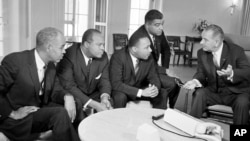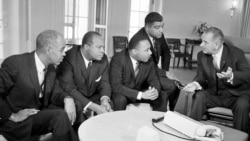In early April, President Barack Obama and three former Presidents—Jimmy Carter, Bill Clinton and George W. Bush, met to honor a fourth, the late Lyndon Baines Johnson, and to celebrate the 50th anniversary of the passage of the Civil Rights Act, a landmark law and Johnson’s greatest gift to the nation.
The Civil Rights Act, for the first time ever, explicitly prohibited discrimination on the basis of race, color, religion, gender or national origin. The law’s primary intent was to eliminate acute discrimination suffered by the descendants of African slaves. But over the years, it served as a model for other anti-discrimination laws, such as, for example, the Americans With Disabilities Act.
In 1865, shortly after the end of the American Civil War, the U.S. Congress passed the 13th Amendment to the Constitution, which abolished slavery in the United States. But that did not mean that former slaves, or their descendants, had equal rights. What followed was a century of segregation and injustice—written into law in many of the Southern states, and practiced in much of the rest of the country.
The 1950s saw the beginning of a movement to right horrendous discriminatory practices. The movement grew and exerted growing pressure on lawmakers to change the law so that all American citizens would be treated equally. Six months prior to his assassination, President John F. Kennedy called for the passage of a Civil Rights law. His unexpected death garnered enough sympathy to allow his successor, President Johnson, to introduce the bill, and after a ferocious fight in Congress, the measure passed and became the law of the land.
On April 10th, Barack Obama, the first black President and thus a living embodiment of the success of the Civil Rights Act, honored Lyndon Johnson’s legacy by quoting from one of his final speeches:
“President Johnson stood on this stage, wracked with pain, battered by the controversies of Vietnam, looking far older than his 64 years, and he delivered what would be his final public speech. ‘We have proved that great progress is possible,’ he said. ‘We know how much still remains to be done. And if our efforts continue, and if our will is strong, and if our hearts are right, and if courage remains our constant companion, then, my fellow Americans, I am confident we shall overcome."
The Civil Rights Act, for the first time ever, explicitly prohibited discrimination on the basis of race, color, religion, gender or national origin. The law’s primary intent was to eliminate acute discrimination suffered by the descendants of African slaves. But over the years, it served as a model for other anti-discrimination laws, such as, for example, the Americans With Disabilities Act.
In 1865, shortly after the end of the American Civil War, the U.S. Congress passed the 13th Amendment to the Constitution, which abolished slavery in the United States. But that did not mean that former slaves, or their descendants, had equal rights. What followed was a century of segregation and injustice—written into law in many of the Southern states, and practiced in much of the rest of the country.
The 1950s saw the beginning of a movement to right horrendous discriminatory practices. The movement grew and exerted growing pressure on lawmakers to change the law so that all American citizens would be treated equally. Six months prior to his assassination, President John F. Kennedy called for the passage of a Civil Rights law. His unexpected death garnered enough sympathy to allow his successor, President Johnson, to introduce the bill, and after a ferocious fight in Congress, the measure passed and became the law of the land.
On April 10th, Barack Obama, the first black President and thus a living embodiment of the success of the Civil Rights Act, honored Lyndon Johnson’s legacy by quoting from one of his final speeches:
“President Johnson stood on this stage, wracked with pain, battered by the controversies of Vietnam, looking far older than his 64 years, and he delivered what would be his final public speech. ‘We have proved that great progress is possible,’ he said. ‘We know how much still remains to be done. And if our efforts continue, and if our will is strong, and if our hearts are right, and if courage remains our constant companion, then, my fellow Americans, I am confident we shall overcome."






